Why are some people better at video games than others?
TL;DR: in most games, intelligence is the largest factor, followed by hours played, and then reaction time. Hand-eye coordination is definitely important, but it’s hard to tell how much it matters empirically. Talent beats hard work.
Intelligence
I was able to find one study that suggested that rank in League of Legends and IQ scores on the raven’s test correlated at 0.44. With an aside: there were only 56 subjects.
The first question is whether this generalizes to other League of Legends players outside of this sample. It probably does — the correlation is biased, but in both directions: downwards by restriction of range and unreliability, and upwards by publication bias. It’s also similar to the correlation between job performance and IQ.
The second is whether this applies to other games as well. I think that it would apply to other MOBAs or RTS games, but I doubt that it applies to games that are simple in nature like FPS or fighting games.
There is another paper that correlates performance on 10 different games with performance on IQ tests, and finds that the correlation is positive in all cases. The correlation between the arithmetic reasoning subtest (most g-loaded subtest in the battery) and performance in the games ranged from 0.19 to 0.60 — so there’s some variation between games in their relationship between performance and g, but some of this variance is definitely due to mere sampling error. The correlation between the latent factor of gaming skill and intelligence was 0.79, though I find that implausible.
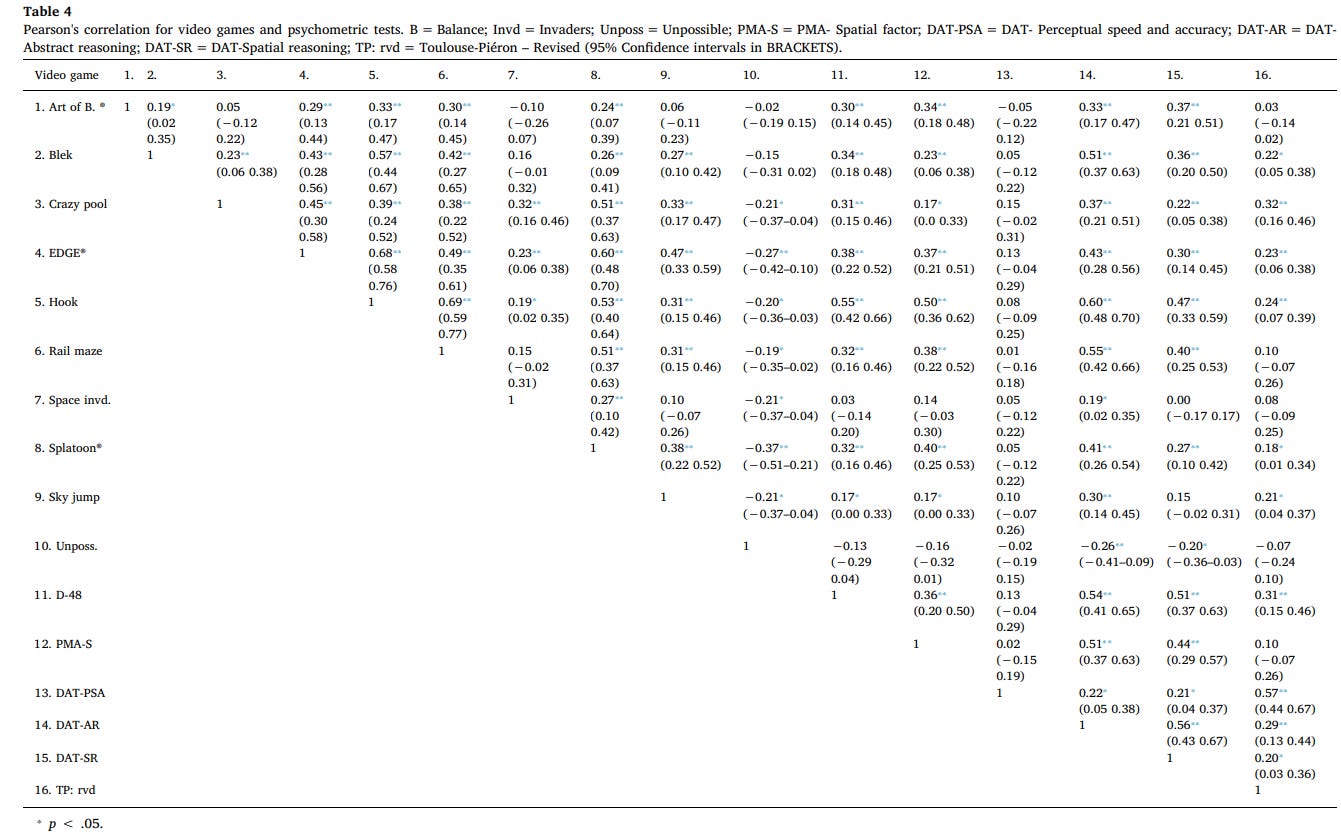
Overall, I think it would be safe to say that the correlation between g and performance in games is somewhere between 0.3 and 0.6. I assume few would question that intelligent players are better at video games than other people, as understanding the underlying mechanics of a game will cause somebody to perform better.
I doubt this is the whole story, however — intelligence is strongly correlated with choice reaction time, and in many games you are not reacting to a single stimuli, but a potential range of stimuli, and therefore the speed at which you can react in game will be dependent on intelligence beyond simple reaction time.
Play time
One of the studies I cited before also analyzed the association between play time and rank. According to them, there was no association after the initial learning period:
After the initial learning stage during which the players attained a relatively stable rank, the magnitude of the correlation between games played and expertise (indicated by MMR) was r = .02
Which is rather misleading — they already specify that the correlation is within players who have attained a relatively stable rank, so it doesn’t mean anything. If only 29 out of the 3 million players on the whole EUW server got to a stable rank, then this correlation would still be observed.
To do the analysis the right way, I went to kaggle, found a dataset of 2200 LoL players, and calculated the correlation between player level (rough indicator of playtime) and rank, and found a correlation of 0.30.
Accounts that are under level 100 are, oddly enough, higher rated than those around level 200, presumably because they are alt accounts. Improvement seems to be nonexistent after one plays enough hours to reach level 750 (somewhere between 4,000 and 8,000 hours, if I had to guess). On average, accounts at the top of the ladder have double the hours of those of those at the bottom of it.
In Overwatch, the difference in hours played between the lowest and highest ranked players is closer to 4x, though self-reported rank and hours played were used, so it’s possible that the choice of variables is to blame for the discrepancy. It is unlikely that this is the case, however, as the correlation between self-reported total hours played and rank in Starcraft is 0.25, even lower than in League of Legends.
One game stands out in terms of being strongly influenced by practice hours: osu!, where the correlation between number of plays and performance points (indicator of skill) is 0.93.
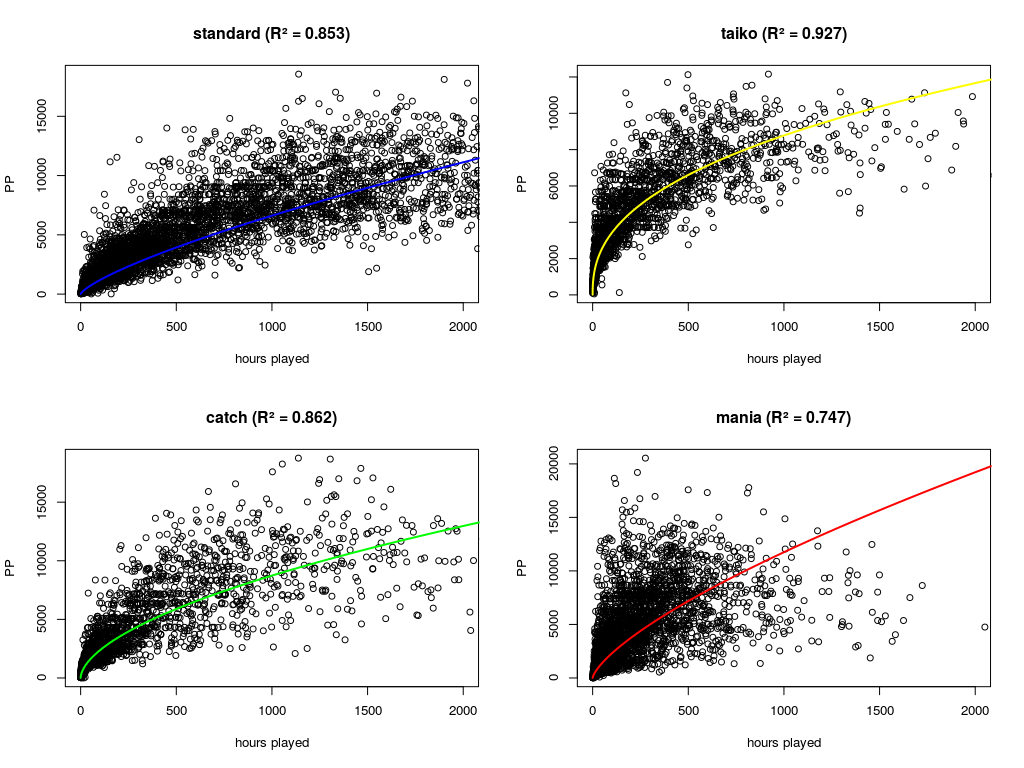
As performance points are calculated from examining a player’s best plays ever, the skill metric is biased in favour of players who play frequently, though I find this to be an unsatisfying explanation as to why the correlation is so strong. Instead, I think that this is due to osu being an extremely intensive game where play time more reliably translates into improvement, in comparison to a game like League of Legends or Counter Strike where playing on autopilot is easier to get away with. I also suspect that people who have more talent for the game play it more often, though I think this is the case for other games as well.
Most gamers think that skills translate across games, and I agree; a person who has spent ~10,000 hours playing competitive games but only 500 hours playing League of Legends probably has less potential to improve than somebody who spent 2,000 hours playing LoL but only 2,000 hours playing other games. Because of that, I would estimate that the true effect of play time on performance is even weaker than the cross-sectional correlation, as I assume that people who play one game a lot are also likely to have played other games a lot in the past.
Reaction time
Reaction time is often cited as a reason as to why some players are better than others, though I am of the opinion that it’s overrated. Often, when people do not react to dangers in game, it’s usually because they don’t anticipate them, not because they lack the reflexes to do so. But the logic behind why people with faster reflexes are better at games checks out; people with fast reflexes react about 2 times faster than those with slow reflexes:

On my old blog, I got access to self-reports of League of Legends rank and reaction time: the correlation was -0.2 (so faster reaction time = better rank). Assuming that reaction time has a reliability of 0.63, the true correlation is probably about -0.25. Pro players in LoL (who are about 5 standard deviations in skill above the population mean) on average have simple reaction times of 187 ms, which is around the 1st or 2nd percentile: faster than you would expect from the linear correlation, but not far from it.
In the same post, I also found a plot of reaction time by rank in CS;GO (FPS game) that finds that the difference in reaction time between the highest and lowest ranked players was about a standard deviation. Given that the lowest rank corresponds to the 4th percentile and the highest rank corresponds to the 99th percentile, this suggests that the correlation between performance and reaction time in this game is about -0.25.
Setup
Using a dataset of top osu players who used mice, I found that those that had higher resolution, higher mouse polling rates, and lighter mice had higher levels of performance. I forgot to correct for restriction of range; to do this, I assumed that there was a competitive playerbase of 5,000,000 people (note: according to the website, there are about 6,000,000 active players and about 37,000,000 created accounts) and that the dataset of top players were representative of the top 40,000 players who played the game — the worst player on the list was ranked #41751.
After the corrections for restriction of range, I found that the estimated correlations within the whole population were three times higher:
Mouse weight/performance correlation: 0.15 → 0.45
Resolution/performance correlation: 0.1 → 0.3
Mouse polling rate/performance correlation: 0.12 → 0.38
Taken at face value, these three variables account for 40% of the total variation in osu! skill.
But I don’t actually believe that.
The three variables are intercorrelated, meaning that the true independent effect of each is smaller than the cross-sectional correlation.
In a regression model, they predict performance at R = .153, so these three variables account for an estimated 20% of the total variation in performance when restriction of range is adjusted for. I assume that differences in hardware start to matter more at higher levels of play because players approach the mechanical ceiling of the game, so adjusting for restriction of range probably overestimates the relationship between hardware quality and performance within the general population.
That said, I think that the community underestimates how much a comfortable or high quality setup can alter performance; having a higher fps in game or a lighter mouse definitely matters, especially in games that are mechanically intensive like Starcraft 2 or osu.
Age
Despite being an avowed and unapologetic ageist, I think that the effect that biological age itself has on gaming skill is massively overblown. Just a month ago, Imp (29 yo KR expro) was rank #2 on the entire Korean LoL ladder after having been retired for over 5 years.
Typically, when people argue that gaming performance declines heavily after the age of ~22 or so, they blame this on intelligence/neuroplasticity or reaction speed. This is not true: empirically, reaction time declines by only 5 ms from the ages of 21-25 to 31-35 and IQ hardly changes between the ages of 20 and 30. Given that 30+ year old sports stars can still perform, I also doubt that hand-eye coordination is responsible for this decline.
Instead, I suspect most pro gamers start losing their hands around the ages of 27-30 because their competitive drive drops. Players who were good have probably saved for retirement, and could easily find a fan who wants to marry them if they want children. Players who didn’t make it will eventually have to accept that they don’t have it in them to win. I also think this happens on a smaller scale to non-professional players who realize where their ceiling is, causing them to lose motivation. But this psychological process doesn’t happen to everybody, and sometimes players maintain their level into their late 20s — like Karrigan or Faker.
Besides that, I also suspect that there is a cohort effect going on, where newer pro players who started playing at a younger age have an advantage over older pros because they have more time to learn the game. Beyond that, pro chess players seem to be getting better every generation, and I think it would be fair to assume that it’s the same for pro gamers.
Genes
The heritability of reaction time is about 80% after controlling for unreliability.
The heritability of intelligence is about 70%.
The heritability of time spent playing video games is about 25% to 60%, with lower heritabilities in girls than boys.
The heritability of hardware quality is probably very low, about 20% maybe. Intuitively I think a lot of people would think the heritability is zero, but remember than most people buy their own hardware.
All in all, I would say that the heritability of gaming skill is about 60% in almost every game; even in osu, as time spent playing video games is also a heritable trait.
Other variables
These theories are hard to test empirically, but I believe in them anyway:
Hand-eye coordination is clearly a large factor in why some players are better at games than others, though it’s difficult to test the extent to which this is the case empirically. This is probably as big of a factor as intelligence, perhaps even more so.
Anecdotally, playing every day is more important than playing long hours, because there are diminishing returns to playing past a certain point on a given day.
There are many examples of pro players who transitioned to poker — Elky, BoxeR, and Yellow from Starcraft; nanonoko, the fighting game player; and WCGRider, the Warcraft player. I find it hard to believe that this overlap is just due to intelligence — some brains are better configured for games.
Personality matters very little, with the exception of traits that are related to competitive drive. The personalities of pro gamers are surprisingly diverse, though there is a tendency towards introversion and poor attention span, which I suspect is due to selection.
Playing against better players matters. Top players from Latin America and MENA are almost universally terrible by international standards, but there are many ethnically Arabic/Hispanic players from the first world who are good; birth country is more important than ancestry at the top level.
In terms of race, it’s the usual rank order, though Black players are worse than what you would expect and East Asian/MENA players are better. The only two good Black esports players I know of are SonicFox and aphromoo.
In terms of countries, Korea is #1 by far, followed by Denmark, Estonia, Finland, Sweden, China, and the rest of Europe. Anglophone countries stand out as underperformers relative to IQ in terms of gaming talent, there are probably more top Danish players than American ones. People have speculated as to why American gamers are so bad; I suspect that it’s due to the popularity of consoles and a noncompetitive culture. Related: some European countries have 30 times the number of Global Elites than others per capita:
I’m not familiar with the Japanese esports scene, but in CS;GO/LoL/Sc2, they are considered to be a joke region; looking through the players with most tournament winnings in Street Fighter, it looks like they are better than American players, but not by much. Korean dominance is different: in LoL, the American player with most tournament winnings is Doublelift at #66 (!) and in Broodwar it is NonY at #98 (!!!).
Upset (LoL pro) asked LS what determines a player’s mechanical ceiling and he was stumped by the question. Neither he or his cohost were bullish on either age or reaction time as factors in gaming skill — LS noted that Faker has a slower than average reaction time among pro players. He also talked about how when broodwar got killed in 2010 and the legacy Korean pros quit, some Western players kept playing and got really good, but when the Koreans came back 2017, they beat the Westerners who stayed, which was a massive shock. When asked about why Korean players are so much better than Western or even Chinese players, he cites the low ping of the Korean server, hours played, culture, and competitive drive as the primary causes.
Conclusion
Given that the factors that contribute to game skill clearly differ by game, notably skill at osu! seems to be largely a function of time spent playing, I made an educated guess about how much x variable affects performance in y game:
I set the correlations between performance and IQ to be relatively low, as I’ve seen hundreds (no exaggeration) of interviews and talk shows that featured pro gamers as guests and their streams as well. Although they are good at the games they play, I would be very surprised if the average IQ of a pro gamer was above 130. My guess is that it’s 120 — about as smart as the average Ivy league student, but nothing to write home about.
I suspect that FPS games or highly mechanically based games do not depend that much on intelligence and instead are more strongly affected by play time, hardware, or hand-eye coordination. Games that are more generalized in nature like MOBAs or RTS games depend more on intelligence and less on play time.
Talent in games is still largely a mystery, though it fairly clear that talent beats hard work in every game except for maybe osu!, though you could argue that the ability to play such an intense game for extended periods of time is a talent itself.
Also, shoutout to whoever is playing Marvel Rivals with my name.


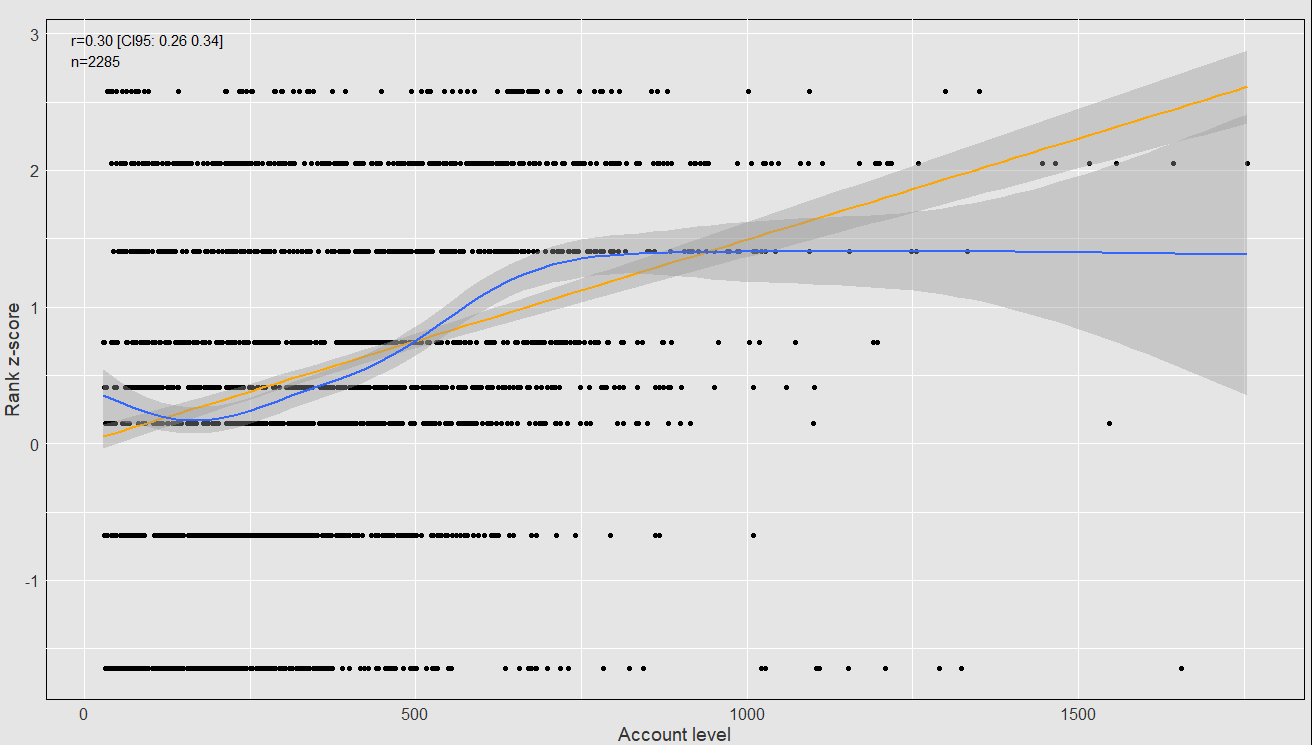
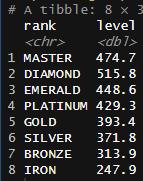
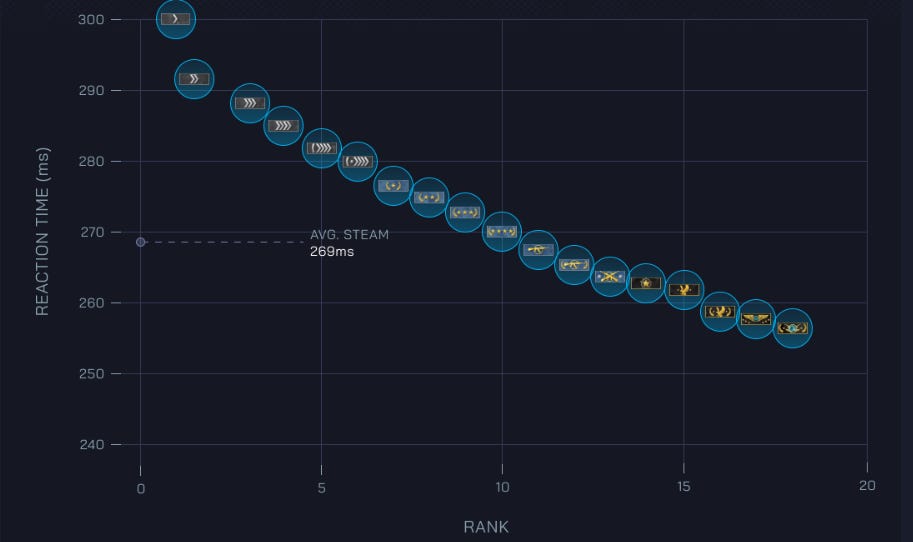

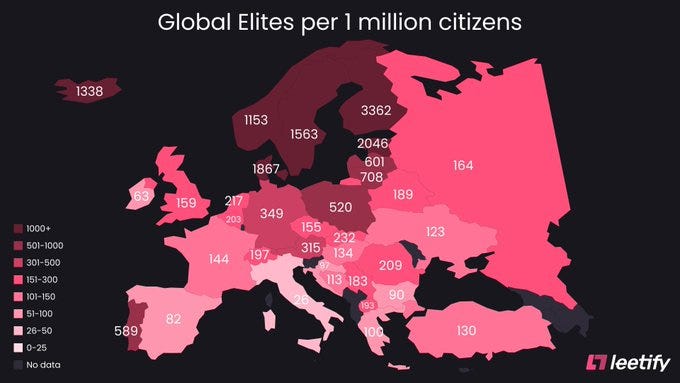

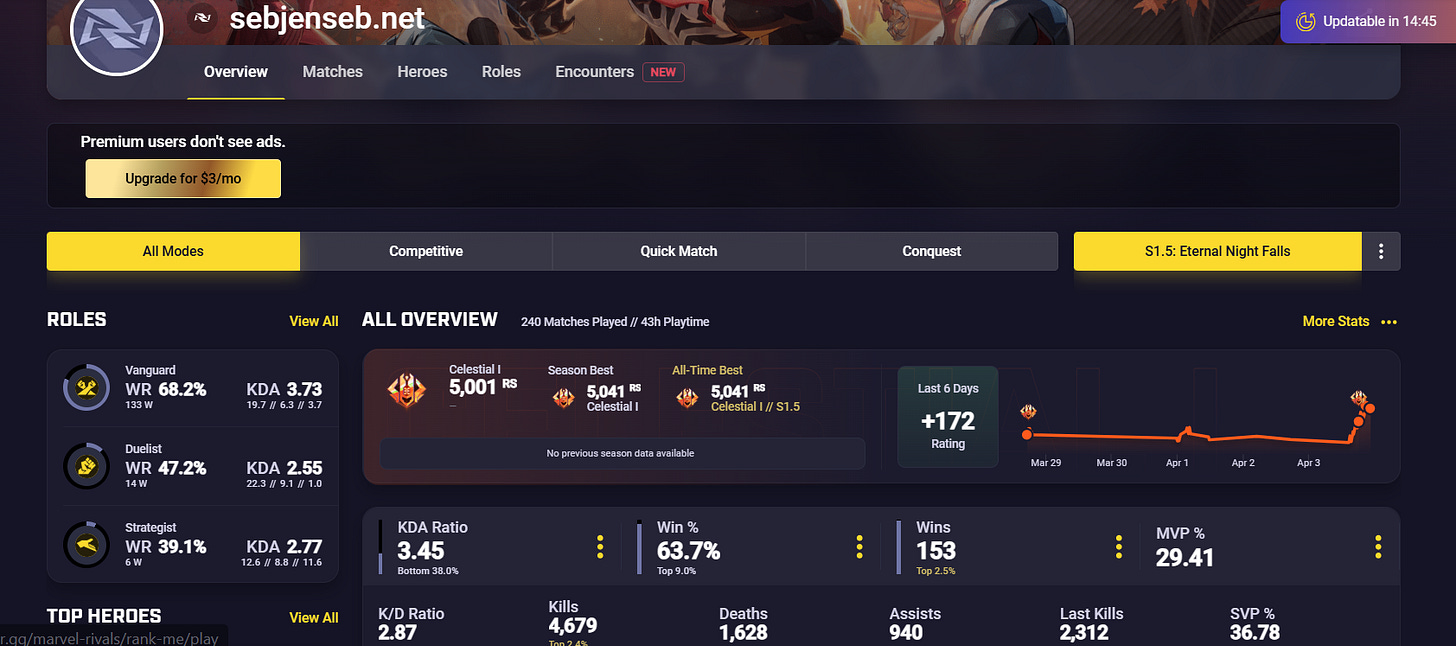
Aside from the connection between intelligence and choice reaction time (the bread and butter of many games), I think IQ probably impacts gaming ability in the same way it impacts vocabulary. A dull person can read as much as they want, they'll probably still have a low vocabulary because they don't parse as much information from reading (and they also tend to have lower memories, so the benefits taper off to some extent). So I'd expect the relationship between hours and ability to be higher in more intelligent cohorts
> Hand-eye coordination is clearly a large factor in why some players are better at games than others, though it’s difficult to measure empirically. This is probably as big of a factor as intelligence, perhaps even more so.
Eye tracker exist, combined with mouse movement or keyboard key pressing, and with screen recording you could test it